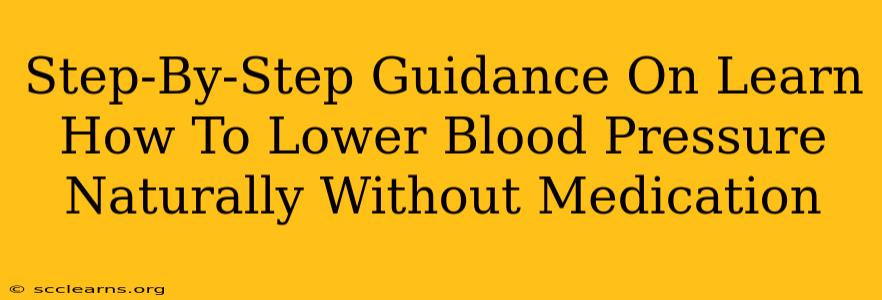High blood pressure, or hypertension, is a serious health concern affecting millions worldwide. While medication is often necessary, many individuals seek natural ways to manage their blood pressure. This comprehensive guide provides a step-by-step approach to lowering your blood pressure naturally, without relying solely on pharmaceuticals. Remember to consult your doctor before making any significant changes to your diet or lifestyle, especially if you have pre-existing health conditions.
Understanding Your Blood Pressure
Before embarking on any natural blood pressure lowering strategy, it's crucial to understand what constitutes high blood pressure and its potential risks. High blood pressure is generally defined as a reading consistently above 140/90 mmHg. Understanding your numbers allows you to track your progress and assess the effectiveness of your lifestyle changes.
What Causes High Blood Pressure?
Several factors contribute to high blood pressure, including:
- Diet: High sodium intake, processed foods, and excessive saturated and trans fats.
- Lifestyle: Lack of physical activity, smoking, excessive alcohol consumption, and chronic stress.
- Genetics: Family history of hypertension.
- Underlying health conditions: Kidney disease, sleep apnea, and others.
Step-by-Step Guide to Lowering Blood Pressure Naturally
This guide outlines practical steps you can take to naturally lower your blood pressure. Consistency is key; these changes should be integrated into your daily routine for optimal results.
Step 1: Dietary Adjustments – The Cornerstone of Natural Blood Pressure Control
Reduce Sodium Intake: Sodium contributes significantly to fluid retention, increasing blood pressure. Limit processed foods, fast food, and salty snacks. Read food labels carefully and choose low-sodium options.
Increase Potassium Intake: Potassium helps balance sodium levels and promote healthy blood pressure. Excellent sources include bananas, potatoes, spinach, and beans.
Embrace the DASH Diet: The Dietary Approaches to Stop Hypertension (DASH) diet emphasizes fruits, vegetables, whole grains, lean protein, and low-fat dairy. It's a powerful tool for blood pressure management.
Limit Saturated and Trans Fats: These unhealthy fats contribute to high cholesterol, a risk factor for high blood pressure. Choose lean meats, poultry without skin, and avoid fried foods.
Step 2: Lifestyle Modifications – Supporting Your Dietary Changes
Regular Exercise: Aim for at least 30 minutes of moderate-intensity exercise most days of the week. Activities like brisk walking, swimming, and cycling are beneficial.
Stress Management: Chronic stress elevates blood pressure. Incorporate stress-reducing techniques into your daily routine, such as yoga, meditation, deep breathing exercises, or spending time in nature.
Weight Management: If you're overweight or obese, losing even a small amount of weight can significantly lower your blood pressure. Combine diet and exercise for effective weight management.
Limit Alcohol Consumption: Excessive alcohol consumption raises blood pressure. If you drink alcohol, do so in moderation.
Quit Smoking: Smoking damages blood vessels and increases blood pressure. Quitting smoking is one of the best things you can do for your overall health.
Step 3: Monitoring and Adjustment – Tracking Your Progress
Regularly monitor your blood pressure using a home monitor. Track your readings and note any trends. Adjust your diet and lifestyle as needed based on your progress. Regular checkups with your doctor are essential to ensure your blood pressure remains within a healthy range.
Supplements and Herbal Remedies (Consult Your Doctor First!)
Some individuals explore natural supplements to support blood pressure management. However, it's crucial to consult your doctor before taking any supplements, as they can interact with medications or have potential side effects. Some commonly discussed supplements include magnesium, CoQ10, and hibiscus tea.
Conclusion: A Holistic Approach to Lowering Blood Pressure
Lowering blood pressure naturally requires a holistic approach combining dietary changes, lifestyle modifications, and consistent monitoring. While these strategies can be highly effective, they are not a replacement for medical advice. Always consult your doctor before making significant changes to your healthcare regimen. By adopting these healthy habits, you can take proactive steps towards managing your blood pressure and improving your overall well-being. Remember, a healthy lifestyle is a long-term commitment to your health.

